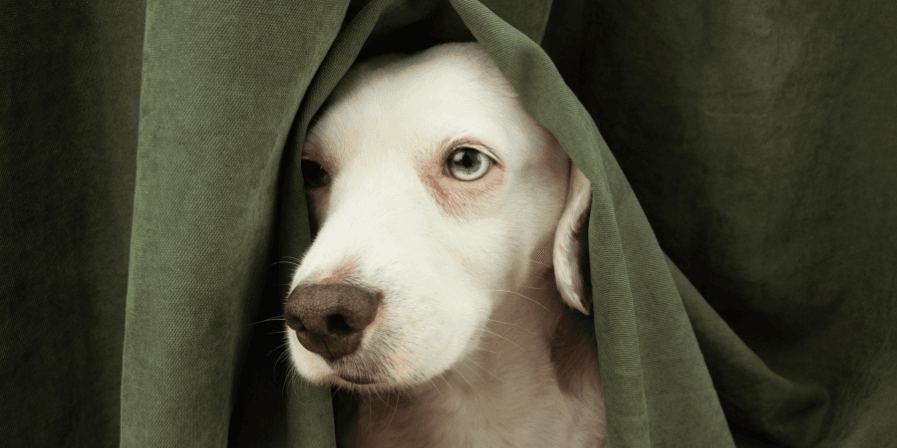6 Tips for Helping a Dog That’s Scared of New Year’s Eve Fireworks

New Year’s Eve is a time for celebration, marked by dazzling fireworks displays. While these spectacles delight many, they can be a source of intense fear and anxiety for dogs. The sudden loud noises and bright flashes can trigger stress responses, leading to behaviours such as trembling, hiding, or excessive barking. To ensure your canine companion remains calm and safe during the festivities, consider the following strategies:
1. Create a Safe and Comfortable Environment
Designate a quiet area in your home where your dog can retreat during the fireworks. This space should be familiar and comforting, equipped with their favourite bed, blankets, and toys. Closing windows and drawing curtains can help muffle the sounds and block out the flashes of light. Playing soft music or turning on the television at a moderate volume can provide background noise that distracts from the external commotion. Ensure this sanctuary is accessible to your dog throughout the evening, allowing them to enter and exit as they feel necessary.
2. Gradual Desensitization to Firework Sounds
In the weeks leading up to New Year’s Eve, initiate a desensitization program to help your dog become accustomed to the sounds of fireworks. Begin by playing recordings of fireworks at a low volume for short periods, observing your dog’s reaction closely. If they remain calm, reward them with treats and positive reinforcement. Gradually increase the volume and duration over time, ensuring not to induce stress. This method aims to reduce sensitivity by creating a positive association with the sounds, thereby diminishing fear responses during actual events.
3. Maintain a Calm Demeanour
Dogs are highly perceptive and can pick up on their owner’s emotional state. Exhibiting calm and composed behaviour during fireworks can influence your dog to feel more secure. Avoid reacting dramatically to the fireworks yourself; instead, engage in normal activities and speak in a soothing tone. If your dog seeks comfort, offer gentle petting and reassurance without overindulging their anxiety, as excessive coddling can sometimes reinforce fearful behaviour.
4. Engage in Pre-Fireworks Exercise
Physical activity can be an effective way to alleviate anxiety in dogs. On the day of the event, engage your dog in a vigorous play session or take them for a long walk earlier in the day. This exercise can help expend excess energy, making them more likely to relax during the evening. However, ensure that outdoor activities are completed well before nightfall to avoid unexpected early fireworks, and always keep your dog on a leash to prevent sudden escapes if startled.
5. Provide Distractions During Fireworks
Offering distractions can redirect your dog’s focus away from the unsettling noises. Provide interactive toys, such as puzzle feeders or chew toys, to keep them occupied. Engaging their mind with tasks can divert attention from the external stimuli. Additionally, practicing basic obedience commands during this time can reinforce positive behaviour and further distract from the noise.
6. Consult Your Veterinarian
If your dog exhibits severe anxiety during fireworks, it is advisable to consult your veterinarian. They can assess your dog’s specific needs and may recommend behavioural strategies or, in some cases, prescribe medication to help manage anxiety. It is crucial not to administer any over-the-counter remedies without professional guidance, as some substances can be harmful to dogs. Your veterinarian can provide tailored advice to ensure your pet’s well-being during such events.
Conclusion
Implementing these strategies can significantly reduce your dog’s fear and anxiety associated with New Year’s Eve fireworks. By creating a safe environment, gradually desensitizing them to the sounds, maintaining a calm demeanour, ensuring adequate exercise, providing distractions, and seeking professional advice when necessary, you can help your canine companion navigate the festivities with greater ease and comfort. Remember, patience and understanding are key components in supporting your dog through stressful situations.
For residents of Delhi NCR & Jaipur seeking professional assistance, DCC Animal Hospital offers comprehensive veterinary services. Their team of experienced veterinarians can provide personalized care and guidance tailored to your pet’s needs. Whether it's behavioural counselling or medical interventions, DCC Animal Hospital is dedicated to ensuring the health and well-being of your furry companions. You can learn more about their services and book an appointment through their official website.
FAQs
1. How do I stop my dog from shaking and panting at fireworks?
Shaking and panting are common signs of anxiety in dogs during fireworks. To help reduce these symptoms, create a calm and secure environment for your dog by providing a quiet space, closing windows, and playing soothing background music. You can also try desensitizing your dog to fireworks sounds before the event by gradually exposing them to low-volume recordings. Offering distractions like toys and engaging in physical activity earlier in the day can also help. In more severe cases, consulting with your veterinarian for behavioural strategies or anxiety-relief medications may be necessary.
2. How long does fireworks anxiety last in dogs?
The duration of fireworks anxiety can vary depending on the dog’s temperament and the intensity of the fireworks display. For most dogs, the anxiety typically lasts as long as the fireworks are happening, which can range from a few minutes to several hours. However, some dogs may continue to show signs of anxiety even after the event has ended, especially if they’ve had a negative experience. If your dog experiences persistent anxiety, it’s advisable to consult with your veterinarian to discuss long-term strategies for managing fireworks-related stress.


 How can we help?
How can we help?